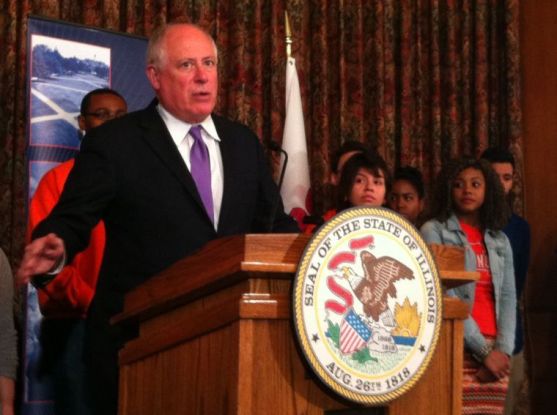Gov. Pat Quinn supports increase in financial aid in University speech

Apr 7, 2014
Last updated on May 11, 2016 at 05:37 a.m.
Students could see an increase in the amount of financial aid they receive, Gov. Pat Quinn said in a speech at the University on Thursday.
Quinn’s March 26 budget proposal includes a $50 million increase to the Monetary Award Program, a student aid program that currently provides support to one-in-five University undergraduates. The increase would allow 21,000 more students across the state to receive MAP grants.
Chancellor Phyllis Wise and University President Robert Easter introduced Gov. Quinn. Easter called Quinn “a great friend of the University of Illinois,” while Wise emphasized that MAP funding is “key” to the success of students at the University.
Quinn, a Democrat, is currently running for reelection against GOP candidate Bruce Rauner, a businessman from Winnetka, Ill.
Get The Daily Illini in your inbox!
“I do not want the crowd that wants to cut this University by $83 million in this budget year, I don’t want them to win.” Quinn said, “I think that’s a losing hand.”
Quinn said that Illinois cannot afford to cut MAP funding or education funding at all, and he does not intend to cut University funding.
“We’re at a turning point,” Quinn said. “If we go in the wrong direction, we’re going to cut funding for education.”
State Sen. Michael Frerichs, D-52, said he felt the MAP program has been successful so far in Illinois.
“It’s a great program across the state of Illinois,” he said. “Students in all corners of the state participate in this and receive the benefits of the MAP program.”
Candace Mueller, the assistant director for external relations at the Illinois Board of Higher Education, said Quinn’s proposal fits well with the aims of the IBHE.
“The Illinois Board of Higher Education recommends the budget to the General Assembly … (and) in our budget recommendation, we do request that MAP funding be protected,” Mueller said. “The governor’s proposal to increase funding for MAP follows right along with our recommendation on the budget.”
Dr. James L. Applegate, the executive director for the IBHE, also said MAP funding needs to be increased, as it could have a positive effect on the University.
“It will make it more possible for our students in financial need and lower income families to be able to consider the University of Illinois as a possibility,” Applegate said. “You certainly don’t want finances to keep qualified students who want to come and take advantage of the University of Illinois to not be able to do so.”
Applegate said the solution to college affordability is two-pronged: MAP funding needs to be increased, but higher education funding should also increase to help hold tuition rates constant.
“One reason the buying power of MAP has declined is because of rise in tuitions,” Applegate said. “The reason tuitions have risen is because of declining state support for higher education.”
Not everyone was supportive of the Governor’s speech at the Illini Union. Ryan Gleason, a senior in LAS, along with Alvar Calderon from DePaul University, held signs just outside the door where Quinn would be speaking, protesting against the governor’s policies.
“I just feel for students leaving this university, having less likely of a chance of obtaining a job and then paying off their higher burden of student debt,” Gleason said. “So that’s why I’m here to demonstrate debt issues with the governor today.”
However, Jason Nwosu, sophomore at Oakton Community College and member of the Student Advisory Committee under the Illinois Board of Higher Education, felt that an increase in MAP funding is essential, and there should be a separate appropriation for community college students.
Nwosu said many community college students don’t know whether they will be returning for another semester until a few days before school begins. Oftentimes, by the time they fill out the FAFSA, most of the funding is gone.
Students can apply for MAP grant funding by filling out the FAFSA. Dan Mann, director of student financial aid at the University, agreed that MAP funding could heavily affect community college students because community college students often apply later than University students.
“I think this will benefit students who attend community colleges and other schools where they may not be applying for financial aid as early as we have the requirement to apply.” Mann said, “Our students are applying early now, so most of our students are getting the MAP.”
Nwosu also spoke to how MAP funding has affected his own education.
“I am a recipient of MAP grant funding,” Nwosu said, “And without MAP grant funding, I wouldn’t be able to pay for my all courses and get all the necessary textbooks and supplies necessary to succeed in my courses.”
Quinn told his audience at the Illini Union there would be a big rally in Springfield on April 30. He encouraged students to attend, either in person or via email.
“We have to win this budget battle, that’s why I’m here, because I’ll be back.” Quinn said. “But we also have to get folks over to Springfield, face-to-face with legislators, to tell them, ‘Don’t be short-sighted. Don’t make a mistake that will harm our future for years to come.’”
Alex can be reached at [email protected].





